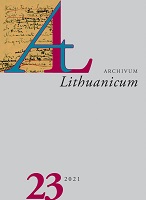Jono Jokūbo Kvanto akademinės veiklos ataskaita: Karaliaučiaus universiteto Lietuvių kalbos seminaras 1724 m.
Johann Jacob Quandt’s Academic Account: The Lithuanian Language Seminar at the Königsberg University in 1724
Author(s): Birutė TriškaitėSubject(s): Christian Theology and Religion, Museology & Heritage Studies, Lithuanian Literature, Baltic Languages, History of Education, 18th Century
Published by: Lietuvių Kalbos Institutas
Keywords: theology; Secret State Archives Prussian Cultural Heritage Foundation; Lithuanian language;
Summary/Abstract: The article introduces a document found in the Secret State Archives Prussian Cultural Heritage Foundation (Germ. Geheimes Staatsarchiv Preußischer Kulturbesitz; GStA PK: I. HA GR, Rep. 7 Preußen, Nr. 187 [1716–1729]) in Berlin that sheds new light on the seminar of the Lithuanian language – the first centre for teaching Lithuanian – that was founded at the Faculty of Theology of the Königsberg University in late 1720s. It is an academic account by Johann Jacob Quandt (1686–1772), the chief preacher of the court and the then dean of the Faculty of Theology of the Königsberg University and the fourth professor of theology in ordinary, who ran the seminar of the Lithuanian language between 1723 and 1727. This account provides insights into the early activities of the seminar that have not been documented in much detail so far. Neither the account nor any of its three appendices – lists of students attending Quandt’s courses – are dated. Based on other documents in the same archive file and the Christian holidays to which the account refers, Quandt’s account has been dated between 28 December 1724 and 11 January 1725, and the data that it contains cover the first half of the 1724– 1725 winter semester: October–December of 1724. Quandt’s account shows that during the winter semester of 1724–1725, the seminar of the Lithuanian language at the Königsberg University was attended by thirty theological students. Theology and language was taught twice daily between 10 and 11 AM and between 3 and 4 PM. The seminar under Quandt’s management continued to apply the so-called collegium privatissimum, the teaching method of its first supervisor, Heinrich Lysius (1670–1731). The names of the seminar attendees from that period are documented in the second appendix to Quandt’s account titled ‘Beyl. B. Auditores Seminarii Lithvanici’: these were Peter Gottlieb Mielcke (1695–1753), who was in his second year as a teacher, Gottfried Boeckel (?–after 1724), Samuel Boeckel (?–after 1724), Alexander Deutschmann (?–after 1724), Michael Sigismund Engel (1700–1758), Carl Julius Fleischmann (1704–1778), Christophor Daniel Franck (?–after 1724), Georg Friedrich Gehrke (?–after 1724), Heinrich Grabau (Grabovius, ?–after 1724), Friedrich Wilhelm Haack (1707–1754), Georg Ernst Klemm (1701–1774), Johann Friedrich Leo (1696–1759), Christophorus (Georg) Liebe (1705–1764), Joachim Friedrich Mey (?– after 1724), Johann Friedrich Mülner (?–after 1724), Jacob Friedrich Naugardt (1694–1751), Friedrich Gottlieb Perbandt (?–after 1724), Adam Heinrich Pilgrim (1702–1757), Heinrich Preuss (?–after 1728), Christoph Rabe (?–after 1724), Heinrich Ernst Rabe (1707/1708–1744), Gottlieb Richter (1707–1775), Johann Richter (1705–1754), Friedrich Rosenberg (?–1727), Adam Friedrich Schimmelpfennig (1699–1763), Ernst Gottfried Schimmelpfennig (1704– 1768), Martin Schimmelpfennig (1706–1778), Gottfried Schumacher (1704–1786), Friedrich Sigismund Schuster (1703–after 1732), Johann Trentovius (Trentowski, 1700–1765). Seven of them attended the seminar back in the winter semester of 1723–1724 and were among the first attendees of the seminar of the Lithuanian language under Quandt after it had been reinstated in 1723. Peter Gottlieb Mielcke was the first teacher at the reinstated seminar. During the winter semester of 1724–1725, the age of the theological students attending the seminar of the Lithuanian language at the Königsberg University was between 17 and 30. Most of them were from Prussian Lithuania. After finishing their studies, at least 19 of the attendees were ordained priests and served in Lithuanian parishes. Out of the thirty students who signed the second appendix to Quandt’s account, at least one-half have not been known as attendees of the seminar of the Lithuanian language yet. Even though the Pietist Georg Friedrich Rogall was very critical towards the seminar of the Lithuanian language under the orthodox Lutheran Quandt in his 1725 letter to August Hermann Francke (1663–1727), professor of theology at the Halle University, it is beyond any dispute that the seminar had brought up a new generation of authors of Lithuanian writings. Six of the theological students who attended the seminar in the winter semester of 1724–1725 had become involved in Lithuanistic activity, albeit from the camps of two protestant movements – the orthodox Lutherans and the Pietists. Three of them – Peter Gottlieb Mielcke, Adam Heinrich Pilgrim, and Adam Friedrich Schimmelpfennig – were actively involved in Johann Jacob Quandt’s project that aimed to renew and enhance the repertoire of religious Lithuanian literature. Three others – Johann Richter, Friedrich Wilhelm Haack (by the way, he became involved in Lithuanistic activity with his proof-reading of the 1727 New Testament published by Quandt in Lithuanian), and Martin Schimmelpfennig – later went to Halle, the centre of Pietism, where they became teachers at the seminar of the Lithuanian language that was founded there in 1727 and drafted Lithuanian books. Quandt’s pupils made a significant contribution to the breakthrough in Lithuanian writings between the 1730s and 1760s.
Journal: Archivum Lithuanicum
- Issue Year: 2021
- Issue No: 23
- Page Range: 59-100
- Page Count: 42
- Language: Lithuanian

